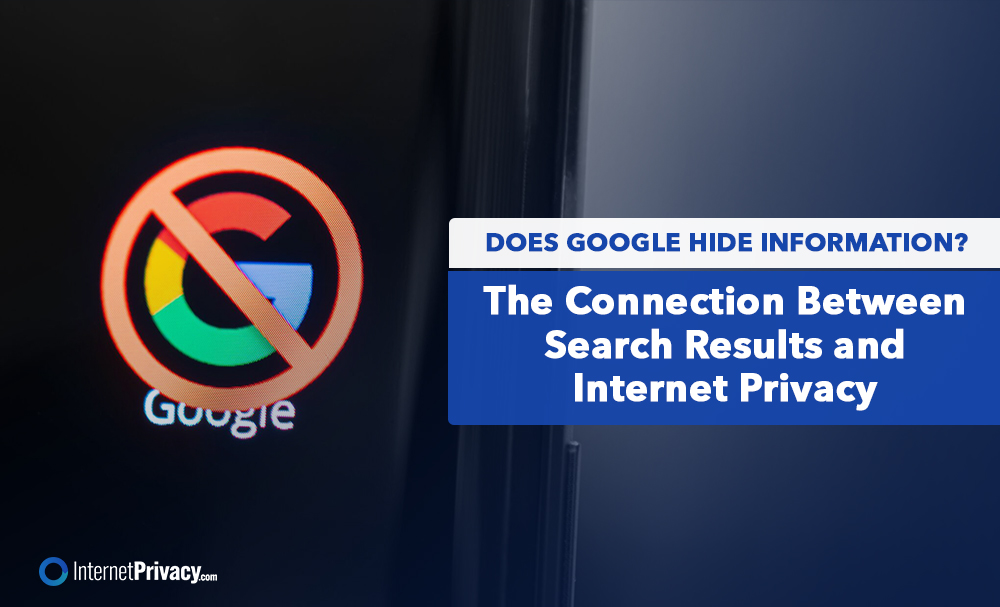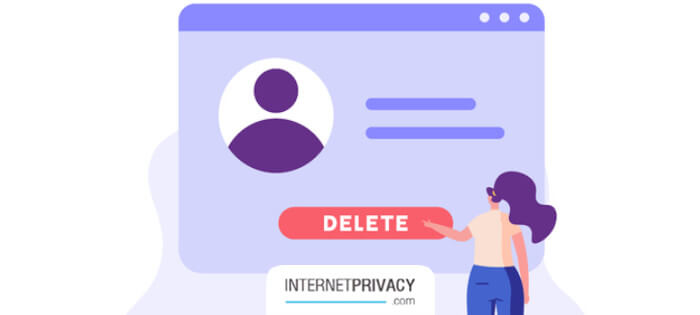Does Google Hide Information? The Connection Between Search Results and Internet Privacy

Google’s search algorithms determine how content ranks in search results. These algorithms affect the visibility of personal information, public records, and potentially harmful content. As they evolve, the methods for collecting, sharing, and using personal data also change, which impacts online privacy.
Understanding Google’s Search Algorithms
Google’s search algorithms are complex systems that organize and rank content based on several factors. These algorithms majorly affect how personal information, public records, and harmful or unwanted content appear online. Understanding them is key to managing your online presence. As users become more aware of the risks of having their data accessible online, knowing how these algorithms work becomes even more important. Staying informed is crucial, mainly as Google updates its ranking systems with machine learning and artificial intelligence. Tools like content removal services and SEO optimization can help individuals protect their privacy by managing how negative articles or reviews rank.
How Does Google Rank Search Results?
Google’s ranking system uses various factors to decide where content appears in search results. These factors include content relevance, user engagement, and data collection practices. The system adapts constantly to changes in user behavior.
Key factors include:
- Content relevance: Google checks how closely the content matches the user’s query to ensure relevant information appears first.
- User engagement: Google monitors how users interact with content. This includes click-through rates, time spent on a page, and whether users return to the site.
- Data collection practices: How a site collects and handles user data, especially regarding privacy and security, can affect its ranking.
User engagement is vital. If users spend a lot of time on a page and interact with its content, Google views it as valuable, boosting its ranking. Transparent data practices also play a significant role. Sites that protect privacy rank higher, while those that misuse data may be penalized.
What Factors Influence Search Results?
Several factors influence how content ranks on Google. Understanding these factors is critical for improving your online visibility. Google evaluates:
- Content quality
- User engagement metrics
- Personal data sharing
Google also considers click-through rates, time on page, and bounce rates to determine the value of content. Personal data like browsing history and location personalize search experiences and affect rankings. Social signals—likes, shares, and comments—reflect content popularity. Additionally, site authority and mobile friendliness are essential for high-quality content to rank well on both desktop and mobile devices.
The Role of Personalization in Search Results and Privacy
Personalization significantly impacts how Google tailors search results for users. It uses past searches, locations, and interactions with content to make search results more relevant. While this improves user experience, it also raises privacy concerns. Google collects and analyzes data, including sensitive information like location and browsing history. This helps refine search accuracy and makes it easier for users to find relevant content quickly. However, this process involves handling personal data, which can put user privacy at risk if misused.
How Does Personalization Affect Search Results?
Personalization significantly changes how search results appear. Google tailors content to fit users’ history, location, and behavior. This means two users searching for the same thing might see different results. While this helps businesses target their audience, it limits how many people can see their content.
Personalization raises ethical concerns about how much data Google collects. The more data collected, the more likely certain content is prioritized, which can skew the information available to users. For users worried about privacy, this detailed profiling and targeting of ads raises severe concerns about how invasive personalized data collection has become.
What Information Does Google Use for Personalization?
Google collects a variety of data to personalize search results. Some of the primary data sources include:
- Browsing history: Google tracks the sites you visit and the searches you make.
- Location data: Your location is used to show results relevant to local businesses and events.
- Interactions with Google services: Google tailors search results using data from Gmail, Google Maps, and Google Docs.
Google also collects demographic details such as age, gender, and interests to personalize advertising. While this data can improve search result relevance, it raises significant privacy concerns.
Google’s Privacy Policies and User Data Collection
Google’s privacy policies explain how data is collected, processed, and used. This includes personal information like names, email addresses, location, browsing history, and search queries. Google uses this data to personalize content and ads, but the amount of data collected raises concerns. Many users worry about how much control they have over their personal information. Personalized ads can be useful but also lead to debates about data privacy and user autonomy.
What Data Does Google Collect from Users?
Google collects various types of user data, including:
- Personal information: Names, emails, and phone numbers from account creation.
- Search history: Google tracks your searches and visited websites.
- Identifiable information: Location, browsing habits, and device data used to tailor content and ads.
This broad data collection allows Google to personalize search results and ads but also raises privacy concerns. Many users are unaware of how much of their data is being collected or what it is being used for.
How Does Google Use This Data?
Google uses collected data to customize search results and serve targeted ads. While this enhances user experience, it also raises privacy concerns. Google creates user profiles based on location, search history, and interactions with other services. These profiles allow Google to deliver more relevant content and ads. However, users may unintentionally share sensitive information that unauthorized parties could access. Additionally, extensive data collection increases the risk of data breaches or misuse.
The Connection Between Google Search Results and Internet Privacy
The connection between Google’s search results and internet privacy is growing more important. Privacy and safety concerns rise as Google collects more data to personalize search results. Google uses data like location, search history, and interactions with its services to create personalized search results for each user. While this can make searches more efficient, it raises concerns about how much personal information is being collected and used, especially regarding sensitive details like browsing habits and personal information.
Does Google Hide Information from Users, and What Are the Implications for Child Safety?
Some claim that Google hides certain information, especially content that doesn’t align with privacy policies or is deemed too sensitive. This is often to protect child safety and filter explicit content. While this helps safeguard minors, it raises concerns about transparency. Google’s algorithms might limit access to certain types of information. Users could be exposed only to content that fits specific guidelines, leading to skewed or incomplete information. This issue becomes critical when considering topics like health or controversial subjects, where full access to information is essential. Organizations like the FTC have discussed the societal implications of Google’s filtering practices, stressing the need for greater transparency and accountability.
What Impact Does Personalization Have on Internet Privacy?
Personalization enhances the online experience by making content more relevant. However, it also creates significant privacy concerns. As companies like Google collect and analyze vast amounts of data to deliver personalized content, privacy risks and concerns about user control emerge. While personalization makes search results more relevant, it also increases the risk of data breaches and misuse. The detailed user profiles that personalization requires can expose sensitive information to malicious actors.
Here are key concerns related to personalization:
- Data breaches: Personal data collection increases exposure to cyberattacks. Sensitive data like browsing habits, location, and personal preferences can become targets.
- Malicious actors: Hackers can exploit personalized data for phishing or unauthorized access.
- Ethical considerations: Personalization raises concerns about users’ control over their data. While it enhances user experience, it also gives companies significant power over data collection and use.
The ongoing dialogue around internet privacy focuses on balancing user experience and protecting personal information.
Criticism and Controversy Surrounding Google’s Information Hiding
Google has faced criticism for hiding or prioritizing certain content, raising questions about transparency and user autonomy. Critics argue that by filtering search results, Google limits access to important information, potentially affecting societal understanding. Content related to sensitive or controversial topics is often deprioritized, giving users a partial view of critical issues. Organizations like the Electronic Frontier Foundation have raised concerns about users’ rights to access a full range of information.
Is Google’s Personalization Ethical?
The ethics of Google’s personalization practices have sparked debate. Personalization improves user experience by tailoring search results but also relies on extensive data collection. Many users are unaware of how much data is collected through Gmail and Google Docs. This lack of transparency can lead to feelings of being monitored, which raises privacy concerns. Advocates and privacy groups call for greater clarity about how data is used. The ethical debate centers on how to balance personalization with user privacy.
What Are the Concerns About Google’s Data Collection Practices?
Google’s data collection practices have led to concerns about privacy, identity theft, and data misuse. The large volume of data that Google collects—including search history, location, and personal information—raises the risk of privacy violations. Many worry about how long this data is stored and its vulnerability to breaches. Despite investments in privacy-focused technologies, critics argue that stronger data protection measures are needed. Users should review their privacy settings and use tools like DeleteMe to manage their online presence and reduce risks.
Protecting Your Privacy While Using Google
To protect your privacy while using Google, take control of your data settings. Regularly review your privacy settings to limit the amount of data Google collects. Turn off location history, manage ad personalization, and review account activity to ensure no unauthorized access. Be cautious about what personal information you share online. By controlling these settings, you can reduce your exposure to privacy risks.
What Steps Can Users Take to Protect Their Privacy and Manage Their Online Presence?
To protect your privacy and manage your online presence, follow these steps:
- Turn off location history: Stop Google from tracking your physical movements.
- Manage ad personalization: Limit the use of personal data for targeted ads.
- Review account activity: Regularly check for unauthorized access to your account.
Being careful about what information you share online helps protect your privacy. Understanding how platforms use your data enables you to make informed decisions about your online presence. These steps reduce your digital footprint and give you more control over your personal information.





